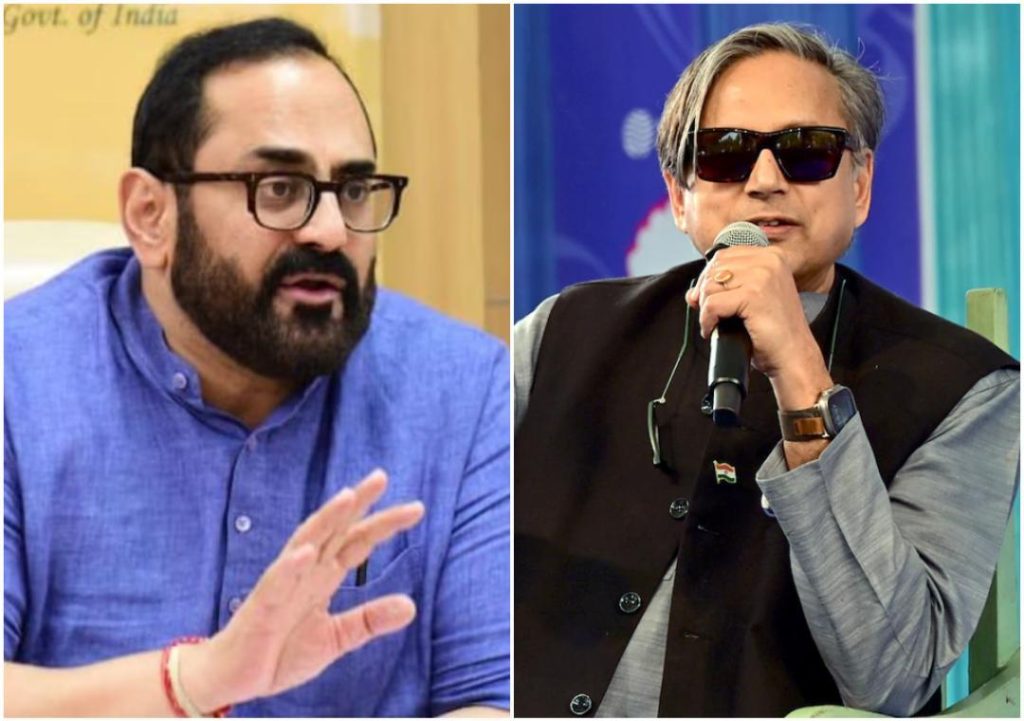
HC Issues Notice to Tharoor on Chandrasekhar’s Defamation Plea
The Delhi High Court has issued a notice to Congress MP Shashi Tharoor over a defamation plea filed by BJP’s Rajeev Chandrasekhar. Chandrasekhar has alleged that Tharoor defamed him by claiming that he “bribed” voters during the 2024 polls. The high court has sought Tharoor’s response and listed the matter for September 16.
The development comes after the trial court dismissed Chandrasekhar’s complaint against Tharoor, stating that the allegations made by the Congress MP were “mere allegations” and did not constitute defamation. However, Chandrasekhar has appealed against the trial court’s order, seeking directions to Tharoor to refrain from making such allegations in the future.
In his plea, Chandrasekhar has alleged that Tharoor made the defamatory statement during a public rally in Delhi, where he claimed that Chandrasekhar had “bribed” voters to secure votes in the 2024 polls. Chandrasekhar has contended that the statement was made with the intention to harm his reputation and has caused him irreparable damage.
The BJP leader has sought damages of Rs 5 crore from Tharoor and has also sought an apology from him. Chandrasekhar has argued that the trial court erred in dismissing his complaint and has prayed for the high court to set aside the trial court’s order.
The high court’s notice to Tharoor comes as a significant development in the case, which has been making headlines in recent weeks. The dispute between Chandrasekhar and Tharoor has been seen as a reflection of the bitter political rivalry between the two parties.
The case is likely to have far-reaching implications for political discourse in the country, with the high court’s decision expected to set a precedent for future cases of defamation involving public figures.
Background
Tharoor and Chandrasekhar have been engaged in a bitter political rivalry for some time now. During the 2024 polls, Tharoor accused Chandrasekhar of bribing voters to secure votes in the elections. Chandrasekhar had denied the allegations, calling them “baseless” and “false”.
The dispute escalated when Chandrasekhar filed a complaint against Tharoor, alleging that the Congress MP had made defamatory statements against him. The trial court dismissed the complaint, stating that the allegations made by Tharoor were “mere allegations” and did not constitute defamation.
Chandrasekhar has appealed against the trial court’s order, seeking directions to Tharoor to refrain from making such allegations in the future. The high court’s notice to Tharoor is a significant development in the case, which is expected to set a precedent for future cases of defamation involving public figures.
Implications
The high court’s decision in the case is likely to have significant implications for political discourse in the country. The dispute between Chandrasekhar and Tharoor has highlighted the need for public figures to exercise caution when making statements about others.
The case also raises questions about the limits of free speech in political discourse. While public figures have the right to express their opinions and criticize their opponents, they must also be careful not to make defamatory statements that could harm others.
The high court’s decision is likely to set a precedent for future cases of defamation involving public figures. It is expected to provide guidance on the limits of free speech and the need for public figures to exercise caution when making statements about others.
Conclusion
The Delhi High Court’s notice to Tharoor on Chandrasekhar’s defamation plea is a significant development in the case. The high court’s decision is likely to have far-reaching implications for political discourse in the country, with the potential to set a precedent for future cases of defamation involving public figures.
The case highlights the need for public figures to exercise caution when making statements about others, and the need for the court to balance the right to free speech with the need to protect individuals from harm.
The outcome of the case is eagerly awaited, with many expecting the high court to provide guidance on the limits of free speech and the need for public figures to exercise caution when making statements about others.
Source: https://repository.inshorts.com/articles/en/PTI/33be843b-70dd-40ee-b8a5-0cf13c5d2647






